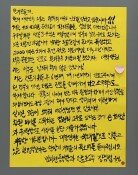Distrust Over Tamiflu`s Adverse Effects Rising
Distrust Over Tamiflu`s Adverse Effects Rising
Posted November. 16, 2009 08:32,
Tamiflu, an anti-viral drug to treat the H1N1 influenza virus, had nothing to do with a teenagers attempted suicide, health authorities said yesterday.
A 14-year-old boy in Bucheon, Gyeonggi Province who had taken Tamiflu leapt from an apartment building Oct. 30.
The center for countermeasures against influenza at the Health, Welfare and Family Affairs Ministry said, After conducting an epidemiological study and consulting experts, we have concluded there was little possibility that Tamiflu caused him to kill himself. He took just one dose of the anti-viral drug.
The boy had sought medical attention due to high fever Oct. 29 and was prescribed Tamiflu. The following day, he went to bed after taking the medicine but woke up from a nightmare and jumped from his sixth-floor apartment.
He is receiving treatment at Soonchunhyang University Hospital.
The healthy teenager took Tamiflu along with antibiotics, antihistaminic and painkiller. A complete medical examination found that he suffered no problems in his brain and spine.
The incident has raised speculation that Tamiflu can cause certain changes in a teenagers brain, leading to erratic behavior.
In Japan, a series of teen suicides in 2007 found that they took Tamiflu. Since the sale of the anti-viral drug was permitted in 2001, Japan had been the worlds largest consumer of Tamiflu from 2001 to 2007 with up 70 percent of global consumption. With the number of teenagers who jumped to their deaths from a building or in front of trucks increasing, fear over the adverse effects of the drug has risen.
According to a survey by the Japanese Health Ministry of 137 teen seasonal flu patients from 2006 through 2007 who either rushed out from their houses on an impulse or jumped from a building, 82 of them or 60 percent were found to have taken Tamiflu.
The ministry conducted another survey in June of 10,000 children under age 18 and banned medical institutions from prescribing Tamiflu for those under 18. It said the relationship between Tamiflu and odd behavior cannot be proven nor denied.
If taking Tamiflu is necessary, a teenager should be monitored for two days, the ministry said.
In the wake of the suicides, distrust in Tamiflu among the Japanese is rising. The ministry said 12 million doses of Tamiflu and 12.7 million doses of Relenza, another antiviral drug for the flu, will be provided from September through March next year. Though the stockpiles of the two medicines are almost the same, the increase rates of supply are different. The stockpile of Tamiflu grew 2.6 times from last year, but that of Relenza jumped 6.7 times over the same period.
Kwon Joon-wook, in charge of infectious diseases at Koreas Health, Welfare and Family Affairs Ministry, said, Experts say that adverse effects occur when a full day or two days of doses of a medicine are taken, adding, Similar cases have been reported in the United States and Japan, but no relationship between the medicine and strange behavior has been established.
Close monitoring, however, has been recommended for young children and teenagers if they take the medicine for prevention purposes.
isityou@donga.com
Headline News
- Med professors announce intention to leave hospitals starting Thursday
- Bridge honoring Sgt. Moon Jae-sik unveiled in Pennsylvania
- Chief of Staff Chung tells presidential secretaries to stay away from politics
- US FTC bans noncompete agreements
- N. Korea launches cyberattacks on S. Korea's defense companies







